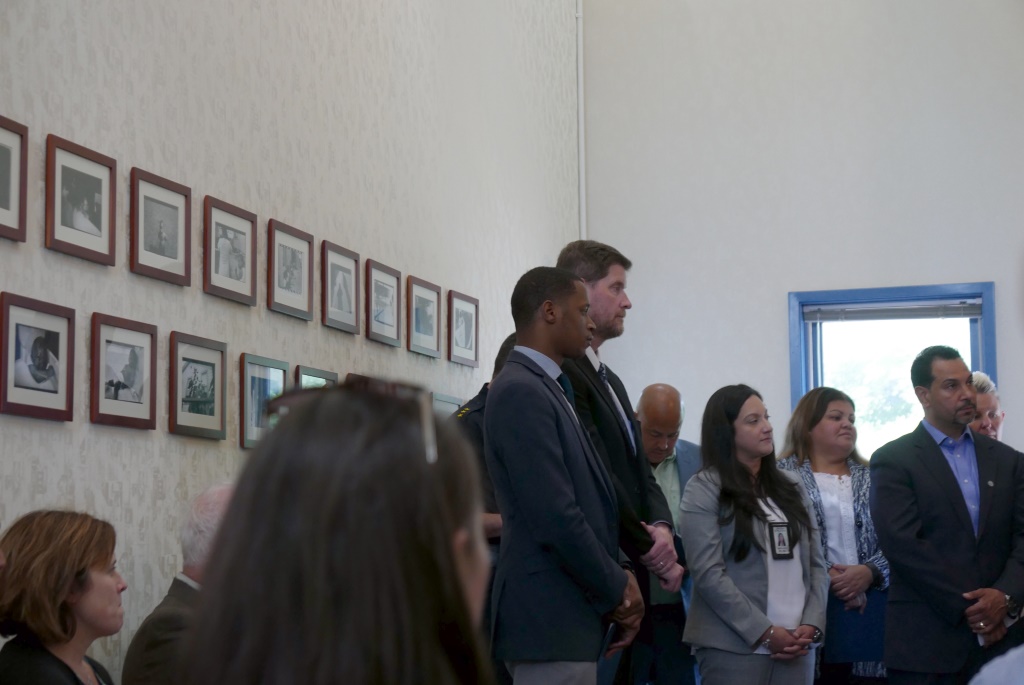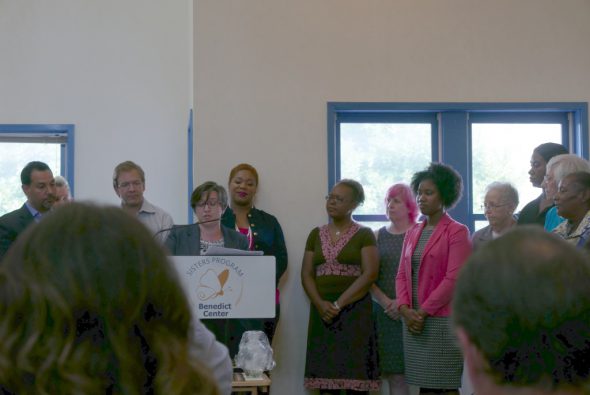Help Offered for South Side Prostitutes
Police, county partner with Benedict Center to combat growing prostitution problem.

“The women who were engaged in prostitution were not as often doing so by engaging in a choice of free will,” stated District Attorney John Chisholm. Photo by Graham Kilmer.
A unique program aimed at disrupting the cycle of prostitution in Milwaukee is expanding with a new location on the city’s near South Side.
The Sisters Program, run by the Benedict Center, a community-based non-profit that provides substance abuse and mental health services, diverts women engaged in prostitution on the streets to resources like housing and supportive services to help lift them out of prostitution. For this, the center has partnered with the Milwaukee County District Attorney and the Milwaukee Police Department and a number of churches throughout the city. The new branch is called Sisters Program South and operates out of the Hope House at 209 W. Orchard St.
Very often the victims of prostitution are women who have been forced, for various reasons, into prostitution. With the help of local stakeholders the diversion program seeks to treat the problems that lead to prostitution as opposed to simply incarcerating the women.
At a press conference last week announcing the new program, one person after another — elected leaders, law enforcement officials, health professionals — all said that prostitution, like many criminal problems, is something a community cannot simply solve with incarceration. In an age when “mass incarceration” has increasingly been condemned, local leaders, especially in law enforcement, are looking to new tactics and options.
Jeanne Geraci, executive director of the the Benedict Center, said 50 percent of women engaged in prostitution are homeless; meaning they literally live on the street or have insecure and unpredictable housing. Many women also come from backgrounds of extreme poverty and sexual abuse, and as such, are extremely vulnerable to human trafficking.
“We recognized early on, the population that was engaged in prostitution, you had this unique combination of the attributes of a victim, and yes, a person that was engaging in behavior that led to arrest and possible prosecution,” said District Attorney John Chisholm. “The women who were engaged in prostitution were not as often doing so by engaging in a choice of free will.”
The problem of street prostitution is an old one, and arrest and incarceration have not solved it so far, either for the prostitutes or the communities impacted by it.
“Policing alone will not end the problem of street prostitution,” said Assistant Police Chief James Harpole. “We know that it is such a complex issue.”
Using street outreach teams and a drop-in center, the Sisters program identifies women engaged in prostitution and informs them about the program and the services available to them, and can even provide the women rides to the drop-in centers located in the second and third police districts. These are the districts where 82 percent of all prostitution arrests happen in the city, said Arnitta Holliman, Sisters Program director.
“We are a part of the community response for street-based prostitution,” Holliman said.
This partnership, Harpole said, is a result of the steps Chief Ed Flynn has taken to realign the police department to allow for collaborations like this.
Flynn, said Harpole, has “focused heavily on transitioning this police department away from one that was not open to bringing in partners and collaborating with others.” That is now happening, he noted, and can have an impact in heavily-policed neighborhoods.
Along with the diversion program, Milwaukee police are also targeting the johns that frequent neighborhoods with high levels of street prostitution in order to tamp down the demand, Harpole said.
The expansion of this program is an example not only of public and private entities partnering in crime prevention, but also in realigning criminal justice tactics to target the roots of crime, and fashion effective responses to this.
“They’re an extraordinarily vulnerable population,” Chisholm said of the prostitutes. “And our obligation as public safety individuals is to serve the needs of the neediest people and the most vulnerable people in our community.”























the Milwaukee police department has no vice squad so nothing to see here on this complex issue
Is an active vice squad the one and only way a police department can effectively address “this complex issue?” Maybe we’d be better off legalizing and regulating prostitution.
So complicated. Those of us who live in these neighborhoods ravaged by prostitution and all that comes with it support these efforts, but the challenges persist. It really has come down to either accepting that prostitution and the accompanying drug dealing will continue to thrive outside your front door (literally), or move. One can only take a stand for so long before capitulation or complete exhaustion sets in. Such a sad situation in so any ways.
MPD apparently either does not have the resources to address this problem or chooses not to deploy the resources in response to this problem. The same can be said about reckless drivers who speed in and out of traffic cutting other drivers off, running red lights putting both pedestrians and other drivers at great risk in the city. If flynn would direct some resources at both the traffic issues and this prostitution problem it would also translate to a decrease in other crime as many of these people would be snapped up on outstanding warrants.
In order to reduce and hopefully eliminate this problem, we must reduce the demand for prostitutes. The way to do this is to publicly name the men who go into the area seeking prostitutes. Obviously, this would require women in the Milwaukee Police Department to pose as prostitutes and arrest the men and put their names in the newspaper.
This is such bullshit. It’s not called the oldest profession in the world without a reason. It’s just more tax dollars going to a militarized police agency that will do nothing but elevate the situation.
You want to get rid of prostitution, it’s call job creation for low income and minimally educated folks and that is not going to happen any time soon. Especially with the loss of so many job opportunities for this segment of our society to technology and automation. How many baristas do you know with college educations that cannot find work in there chosen or mildly related field?
Low income folks have to work two or three jobs to pay the bills, and there living in pretty underwhelming situations.
The reality is automation and technology is eliminating jobs rapidly and even China is starting to feel the effect of these pressures.
The job opportunities out there require education and those jobs may only last a few years before retraining is required. We all know how much it costs to attend college or a trade school.
Besides finding work that can actually pay a living wage $20 an hour a universal basic Income should be considered on a City level.